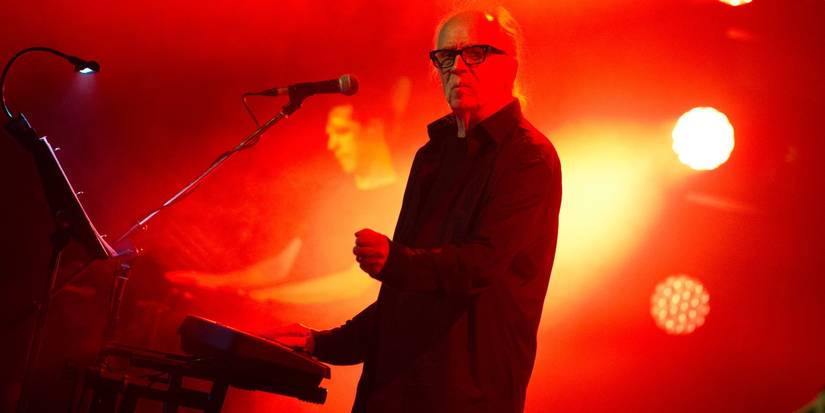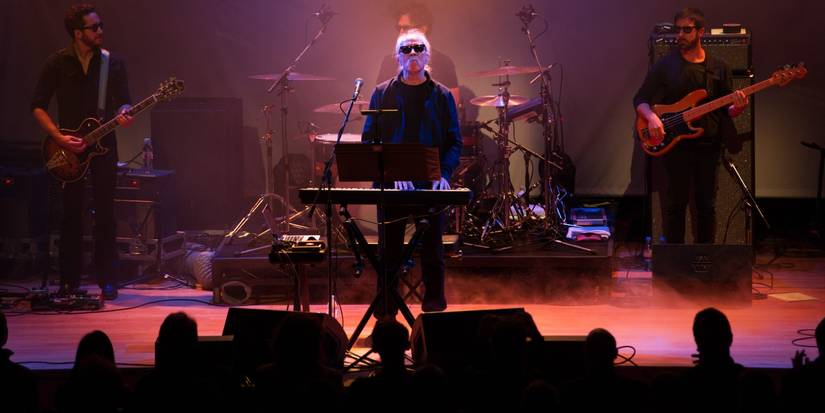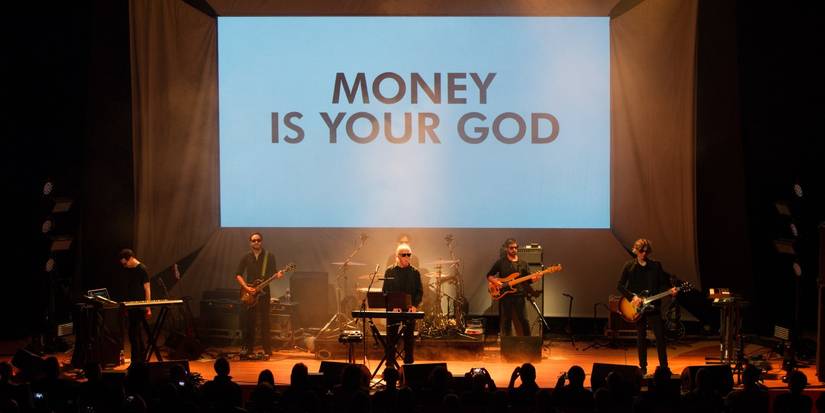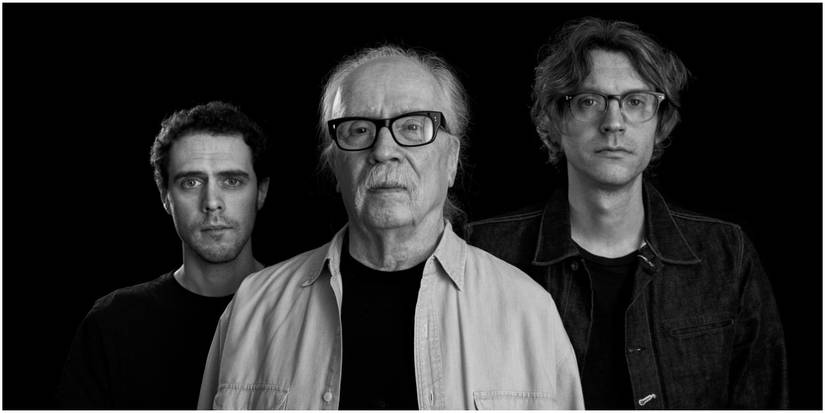After 77 years on earth and 55 working in Hollywood as a writer, director, composer and producer, there are very many things that John Carpenter has accomplished in Hollywood. Developing a talent, much less an inclination for bullsнιт isn’t one of them.
Carpenter, the filmmaker responsible for Halloween, The Thing and Big Trouble in Little China, has directed only two feature films since 2001. But he has helmed two episodes of the anthology series Masters of Horror, produced a remake (The Fog) and three sequels (David Gordon Green’s Halloween trilogy) of his earlier work, and composed music for almost a dozen other big- and small-screen projects.
If you’ve been lucky enough to hear him speak at repertory screenings of his work, or even luckier, to speak to him directly in an interview or on a set, then you know that he always offers a decidedly unvarnished truth about what he’s doing and why. And usually it involves a combination of receiving a check, and the opportunity to sit in his living room lounge chair watching basketball (or playing video games).
In the absence of more recent film and TV projects, Carpenter’s career as a composer—begun way back on his Oscar-winning 1970 short film The Resurrection of Broncho Billy—has flourished. Since 2015, he’s recorded four volumes of movie-free music, Lost Themes, with his son Cody and collaborator Daniel Davies, a remix album and an anthology of classic themes. Via licensing deals, he’s also been involved in individual reissues of his earlier music.
In October, Carpenter embarks on his latest tour with his son and Davies. Ahead of his upcoming Halloween (which of course will involve Halloween) shows in Los Angeles, Carpenter spoke with ScreenRant about the shift in his career to focus on music, and the inspiration he draws (and doesn’t draw) from what he’s accomplished, and what’s going on in the world. Additionally, he revealed one project (in fact, a pair of them) that has yet to be released to the public.
What Fans Can Expect On This Tour
ScreenRant: How has your set list changed to emphasize some of your more recent work more heavily than those classic scores for your earlier films?
John Carpenter: Well, we’ve done a mix. Daniel here came up with a set list.
Dan Davies: Yes. Since we toured, we put out Lost Themes III and IV, so we’ll be playing some stuff that we’ve never played before, and cues from some of John’s movies that we’ve never performed before either. So it’s a mix of everything.
ScreenRant: How locked in are the performances you give on stage? Is there room for riffing, or do you prefer something that’s more тιԍнтly choreographed?
Davies: We don’t jam.
John Carpenter: We could, I guess.
Davies: No, I don’t jam. It’s all structured-
John Carpenter: I don’t jam? Is that true?
Davies: You don’t jam either. We don’t jam. It’s all put together and there’s video and lights, so it’s all kind of put together to fit around the music, so we’ve just designed it that way. It’s not like a Grateful ᴅᴇᴀᴅ show. It’s more structured.
ScreenRant: Notwithstanding the heavy hitters that you guys play all the time, is there a lot of change in the order of things, or does it stay pretty much the same from one night to the next?
Cody Carpenter: Each night, we actually have different set lists, and we’ll be playing specific cues from movies that we haven’t played before. So if someone just comes to one night, they may not actually hear all the songs that we have to play.
Working Together Brings Out Different Influences
ScreenRant: John, how have your collaborations with Cody and Dan felt different than when you were working with Alan Howarth in the 1980s?
John Carpenter: It’s totally different. Alan was more of an engineer, and he was not really a creative partner; these guys are creative partners from the get-go. We all contribute.
ScreenRant: Cody and Dan, do you feel like it’s an equal contribution, or given the incredible pedigree of John’s work, do you guys go in and go, ’he knows what he’s doing, we’re going to take his lead?’
Davies: We just rely on the incredible pedigree.
John Carpenter: Stop it. Stop it. Stop it.
Cody Carpenter: We definitely follow my dad’s lead, but we also contribute just as much. But he is definitely the leader and sort of gives us direction.
John Carpenter: Don’t let him fool you.
Davies: Everything is different. For Lost Themes, we each bring in sketches and they evolve together, and then whoever’s track kind of takes the lead on that. And then with the movies, we make music in motion, so everything is just happening based on the visual or an idea, and it evolves from there, and everyone just does their thing and it all works really well. We have a shorthand communication now.
ScreenRant: In the past you’ve talked about the influences that you drew upon for themes like ᴀssault on Precinct 13, et cetera. Do you remember a point in your creative process when you no longer felt like you were being influenced consciously from the outside, and it was more just about receiving pure inspiration from within?
John Carpenter: There’s nothing pure about movies. When you’re directing in Hollywood, California, it’s for money. Movies are about money. And in terms of success, if you make money for the studios, they love you. If you don’t, they don’t love you.
How The Trio Stays Creative These Days
ScreenRant: Has it been tough to keep that creative process unencumbered, not only by those external factors, but by your own legacy? Is it easy to start working on music and not feel the impulse to refer upon what you’ve done in the past, or what people expect from you?
John Carpenter: Can’t do that. We can’t do that. We have to move forward.
Davies: Yeah, we just get inspired. We don’t consider all that. We just do what sounds good to us in the moment.
John Carpenter: It’s a lot simpler than you think: If it sounds good, it’s what draws us.
ScreenRant: So many of your films have these socio-political edges. You’ve never been shy about sharing your political beliefs. How much does the volatility of the world inspire ideas in the way that it used to?
John Carpenter: Well, there are a lot of possibilities these days. I tend to keep quiet because there’s a lot of-
Davies: Hostility.
John Carpenter: Yeah, and violence in the world right now. So for now, I’m going to keep quiet. I’m not saying anything.
Davies: Movies and music is an escape for us. For me, I can’t get involved in the outside world anymore. It’s so wild. So doing what we’re doing is so great for that. And maybe sometimes the music gets more aggressive when you feel that from the world. It’s all in you. We’re all in the world together.
ScreenRant: Of course, but John’s films, certainly in the ’80s, were processing what’s happening in the world through storytelling.
John Carpenter: Yeah, look, there are a lot of opportunities to make movies like They Live. That’s the only political movie I’ve ever made, and that’s overt, [although] the others have thematic material that relates to the world. But I don’t know. I’m just going to hunker down. I’m enjoying my life too much to ҒUCҜ it up.
ScreenRant: You talk about the elements that would impact your interest in making another film. The Thing is a remake. Are there other films, just as a viewer, you’ve seen over the years, where you think you could do a better job with that material than maybe what was already done?
John Carpenter: I’ve never thought that. Never thought that. I was thinking about maybe I could do a good job with something, but I only put it on my own. I never put it, I could do a better job. I hate… look, if you direct a movie, that’s an act of courage, and I really don’t want to publicly criticize anybody for directing anything or their work. Privately, amongst the three of us here, for instance, I do a lot of that, but I don’t want to put anybody down.
Could More Reissues, And Even Classic Coupe de Villes Work, Be On The Way?
ScreenRant: You’ve reissued a lot of the material that you’ve done. Is there material that has not yet been reissued or re-released that you might like to reintroduce to audiences?
John Carpenter: No, not really. But I want to do new stuff.
ScreenRant: I know you have that Coupe de Villes album you recorded in the 1980s. Do you still have the master recordings of that?
John Carpenter: You know it.
ScreenRant: Well, I hope that it gets released one day.
Cody Carpenter: Actually, we’ve been trying to get both the rights and the original masters for the two episodes that my dad directed of Masters of Horror in 2005, 2006 for the soundtrack to try to release the soundtrack. But it’s been over 10 years and we’ve had so much trouble getting the rights and finding the masters, all this stuff. But we’re still trying. Hopefully one day we can release that music.
Davies: We’re hoping that you will be the missing link in getting this.
ScreenRant: Given how candidly you’ve spoken about your disenchantment with the movie business, how much has music provided a creative outlet, if not to replace your film work, but to offset maybe its absence?
John Carpenter: Well, you also have to take into consideration quality of life when you’re dealing with these things. Directing a movie is like being a coal miner. The work is ridiculously hard, and the stress is unbelievable. You’ve got money riding on it and a crew riding on it and studios pressuring you. Music, and I’ve changed my mind on this, I think music is the greatest art there is. I think that that’s the invention that man has a chance of immortality through. We don’t have to talk; I can play music here, and somebody in Istanbul can listen to it and enjoy it. So it’s the reason for living.
Davies: And you’re completely free.
John Carpenter: That’s right. So there’s no comparison.
ScreenRant: In that case, are you working as much as you would like to at this point?
John Carpenter: Oh yeah. There are movies I still would love to direct, but I put conditions on it now. It can’t be me backing into a budget, which is what they usually want you to do. I can direct a film from home, which I have done, and I can direct really well. That’s the best. But I would have to have certain parameters. And well, music, I just come downstairs and it’s the greatest.
ScreenRant: Would you say that broadly you consider composing your sort of primary output for the foreseeable future?
John Carpenter: Well, look, cinema is the love of my life. It is the thing I love the most, and that’ll never go away. Now music is great and I love it, but I hate to say this, but I love making movies.









